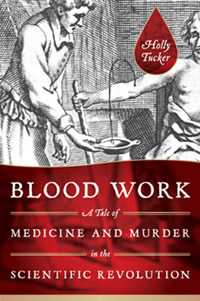“Vivid, Strange, and Reveals Much about Modern Medicine”
Chapter 16 tallies the critical accolades falling to Holly Tucker’s Blood Work
The 1660s saw an intense scientific race between England and France, then the two most scientifically advanced nations. The rivalry was every bit as heated and fervently nationalistic as the race to the moon that occurred between the United States and the Soviet Union three centuries later. This first scientific contest was to demonstrate an understanding and control of the nature of blood by performing the first successful transfusion involving a human being—that is, transfusion to or from a human and another human (or dog, sheep, or any other mammal). The often gruesome experimentation conducted by the eccentric geniuses at the center of this quest is the subject of Blood Work: A Tale of Medicine and Murder in the Scientific Revolution by Holly Tucker, who teaches both French and the History of Medicine at Vanderbilt University in Nashville. Soon after publication in March, the book was named a Scientific American Book of the Month, a History Book Club pick, and a Book of the Month Club pick—all fitting choices, as the book offers something to satisfy scientists, historians, and general readers alike.
 The space race of the mid-twentieth century isn’t the only modern parallel to the contest at the heart of Tucker’s research. As Tucker told Veronique Greenwood in an interview in The Atlantic, “In writing Blood Work, I was continually struck by similarities between the 17th-century blood transfusion debate and our own genomic era. Then, as now, natural philosophers (as scientists were called then) had a clear sense that they were at the forefront of something big. They weren’t sure what it meant and how it would turn out. But they knew it was potentially game-changing in regard to medicine.”
The space race of the mid-twentieth century isn’t the only modern parallel to the contest at the heart of Tucker’s research. As Tucker told Veronique Greenwood in an interview in The Atlantic, “In writing Blood Work, I was continually struck by similarities between the 17th-century blood transfusion debate and our own genomic era. Then, as now, natural philosophers (as scientists were called then) had a clear sense that they were at the forefront of something big. They weren’t sure what it meant and how it would turn out. But they knew it was potentially game-changing in regard to medicine.”
Here’s a sampling of how critics have responded to Tucker’s own game-changing work:
“The book tells us the tale of how the evolving science of blood transfusion was intertwined with religion, superstition and ego. It doesn’t seem like much has changed these days, does it? … Fascinating book and very well-written. I recommend it to everybody.” ~Ira Flatow, on NPR’s Science Friday
“Blood and the process of removing it from people are objects of enduring cultural fascination, as the glut of teenage vampire novels can attest. It was not much different in 17th-century Europe at the dawn of the Scientific Revolution, when a band of natural philosophers armed with knives and goose-quill tubes began to investigate the idea of transferring blood from one person or animal to another. Their story, as told in a new book by Vanderbilt University historian Holly Tucker, is vivid, strange, and reveals much about modern medicine.” ~Veronique Greenwood in an interview in The Atlantic
“Most gripping nonfiction narratives have three qualities that pull readers from page to page: dramatic events, a context that gives those events consequence and complex, well-developed characters. The events in Blood Work hold us in a blood-splattered thrall and make clear their significance in the history of medicine.” ~Jack El-Hai, writing in The Minneapolis Star Tribune
 “Ms. Tucker’s chronicle of the world of 17th-century science in London and Paris is fascinating. A meticulous historian, she paints a compelling picture of rivalries and politics among the various English and French academies and their members.” ~The Economist
“Ms. Tucker’s chronicle of the world of 17th-century science in London and Paris is fascinating. A meticulous historian, she paints a compelling picture of rivalries and politics among the various English and French academies and their members.” ~The Economist
“In tracing the tale of Jean-Baptiste Denis and blood transfusion, Tucker has done a wonderful job of re-creating a time, place and event unfamiliar to most contemporary readers. Plus, she adds a twist by revealing what really happened to [transfusion victim] Antoine Mauroy. It all makes for a riveting story.” ~David B. Williams, writing in The Seattle Times
“Tucker allows us the fun of scoffing at the ancient hysteria surrounding transfusion, but she pointedly shows us that the same fears reverberate through our discourse today. Seventeenth-century Europe told tales of people morphing into grotesque animal-human hybrids; we make movies about humans being cloned for spare parts. Our monsters may be as docile as Dolly the sheep, but we fear them just the same.” ~John Vaughn, in a review for the Cleveland Plain Dealer
“If there is anything Tucker hopes readers will glean from reading Blood Work, it is the lesson that history matters, that a reflection on the ethical conundrums faced by past scientists can guide us through the questions of today.” ~Kim Ukura, writing in The Capital Times
“I felt a lot like Sherlock Holmes. I knew there had been a murder. But why? What was it about blood transfusion that would lead someone to kill to stop the procedure in its tracks? This led me to read everything I could get my hands on about early blood science—and the competing scientific, political, philosophical, and religious beliefs that swirled around it. From there, I compiled a list of suspects. Who had a stake in stopping Denis? It turns out that none of the prime suspects on my list was involved. So I spent a lot of time in archives in Paris, London, and Rome. And it was during one those many trips that I found the smoking gun: a single letter written by a lawyer who was not involved in the trial but who was apparently outraged by the conspiracy. He named the murderous physicians—and once I had those names, I was stunned by how many clues they had left out in the open just waiting, almost proudly it seemed, to be discovered.” ~Holly Tucker, in an interview with Chapter 16
For more updates on Tennessee authors, please visit Chapter 16’s News & Notes page, here.
